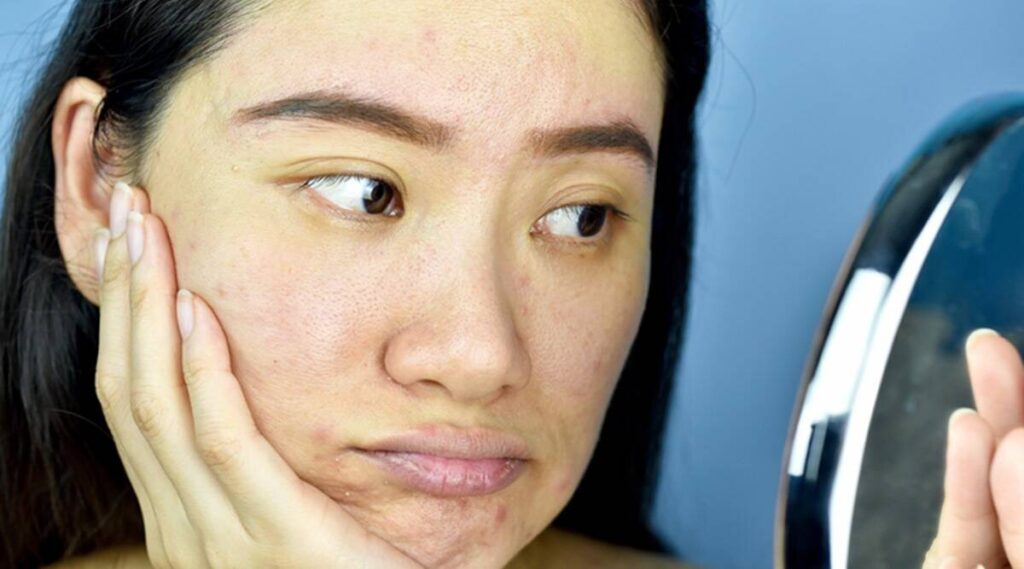
AHA serum has many benefits for the skin. AHAs are primarily used to exfoliate. Not only this, but also, they can help:
Let’s talk about the AHA serum benefits in details.
Table of Contents
AHAs are primarily used to exfoliate your skin. In fact, this is the foundation for all of the other AHA serum benefits.
Exfoliation refers to a process where the skin cells on the surface shed off. This helps remove dead skin cells but also makes way for new skin cell generation.
As you age, your natural skin cell cycle slows down, which can make dead skin cells build up. When you have too many dead skin cells, they can accumulate and make your complexion look dull.
Dead skin cell accumulation can also enhance other underlying skin issues, such as:
Still, not all AHAs have the same exfoliating power. The amount of exfoliation is determined by the type of AHA you use. As a rule of thumb, the more AHAs contained in a product, the more powerful the exfoliating effects.
When these acids exfoliate your skin, dead skin cells are broken down. The new skin revealed beneath is brighter and more radiant. AHAs with glycolic acid can help break down skin cell accumulation, while products with citric acid can brighten your skin even further.
Collagen is a protein-rich fiber that helps keep your skin plump and smooth. As you age, these fibers break down. Sun damage may also accelerate collagen destruction. This can result in sallow, sagging skin.
Collagen itself is in the middle layer of your skin (dermis). When the upper layer (epidermis) is removed, products such as AHAs can go to work on the dermis. AHAs may help promote collagen production by destroying old collagen fibers to make way for new ones.
AHAs are known for their anti-aging effects, and surface lines are no exception. One 2015 studyTrusted Source reported that 9 out of 10 volunteers who used AHAs over a three-week period experienced significant improvements in overall skin texture. Still, it’s important to remember that AHAs work for surface lines and wrinkles only, not deeper wrinkles.
Your risk for skin discoloration increases with age. For example, flat brown spots, known as age spots (lentigines), may develop as a result of sun exposure. They tend to develop on areas of the body that are exposed to the sun most often, such as your chest, hands, and face.
Discoloration may also result from:
AHAs promote skin cell turnover. New skin cells are evenly pigmented. In theory, long-term use of AHAs may reduce skin discoloration by encouraging the old, discolored skin cells to turn over.
The American Academy of Dermatology recommends glycolic acid for discoloration.
You may be familiar with benzoyl peroxide and other acne-fighting ingredients for stubborn blemishes. AHAs may also help treat and prevent recurring acne.
Acne pimples occur when your pores are clogged with a combination of dead skin cells, oil (sebum), and bacteria. Exfoliating with AHAs can help loosen and remove the clog. Continued use may also prevent future clogs from forming.
AHAs may also reduce the size of enlarged pores, which are commonly seen in acne-prone skin. Skin cell turnover from exfoliating glycolic and lactic acids can even reduce acne scars. Some acne products also contain other AHAs, such as citric and malic acids, to help soothe inflamed skin.
And AHAs aren’t just for your face! You can use AHA products on other acne-prone areas, including your backside and chest.
According to the Mayo Clinic, it can take two to three months before you start to see significant acne improvements. It’s important to be patient while the products work to relieve acne over time. You also need to use the products consistently—skipping daily treatments makes it take longer for the ingredients to work.
In addition to their own distinct benefits, AHAs can make your existing products work better by increasing their absorption into the skin.
For example, if you have too many dead skin cells, your daily moisturizer just sits on top without hydrating your new skin cells underneath. AHAs like glycolic acid can break through this layer of dead skin cells, enabling your moisturizer to hydrate your new skin cells more effectively.
Leave a comment